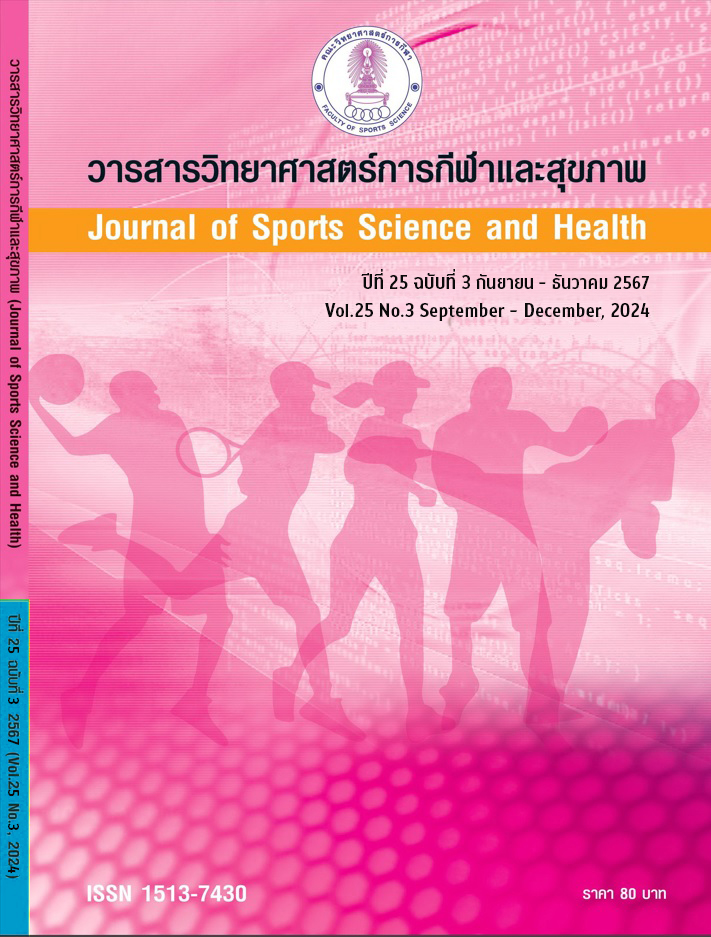FACTORS RELATED TO QUALITY OF LIFE OF MOTORBIKE FOOD RIDERS IN BANGKOK METROPOLITAN
Main Article Content
Abstract
Purpose
This study aims to investigate the quality of life of food delivery motorcycle riders in Bangkok and examine the factors associated with their quality of life. Additionally, it seeks to identify predictors of their quality of life.
Methods
The sample included 562 food delivery motorcycle riders. Data were collected using the Thai version of the WHOQOL-BREF questionnaire, SPST-20 stress assessment, and a researcher-developed questionnaire on personal factors, work environment, and safety. Analyses included frequency distribution, percentage, mean, standard deviation, Pearson's Correlation, with a significance level of .05
Results
Findings showed that food delivery motorcycle riders had a good quality of life, contrary to the initial hypothesis of low to moderate quality of life. There was a low positive correlation between quality of life, the average number of delivery rounds per day, and the average rest time between deliveries each day. Work-related stress was significantly negatively correlated with quality of life at the .05 significance level. Factors such as duration of employment, average income from food delivery, average number of working days per week, and average working hours per day were negatively correlated with quality of life. Work-related stress and environmental obstacles were significant predictors of quality of life, with higher stress levels and poorer working environments leading to significantly lower quality of life at the .05 significance level.
Conclusion
The quality of life of motorcycle riders delivering food in Bangkok was generally good. Factors related to work environmental barriers and stress from work were relevant and could predict quality of life.
Article Details

This work is licensed under a Creative Commons Attribution-NonCommercial-NoDerivatives 4.0 International License.
References
Acta Medica Philippina. (2023). Quality of life and work conditions of food delivery riders in the Philippines. Retrieved from https://actamedicaphilippina.upm.edu.ph/index.php/acta/article/download/6271/4132
Chudum, W., Hasa, K., & Noopud, P. (2023). Sport City and the Development of Peoples Quality of Life. Journal of Sports Science and Health, 24(2), 1-14.
Tran, N. A. T., Nguyen, H. L. A., Nguyen, T. B. H., Nguyen, Q. H., Huynh, T. N. L., Pojani, D., Nguyen Thi, B., and Nguyen, M. H. (2022). Health and safety risks faced by delivery riders during the Covid-19 pandemic. Journal of transport and health, 25, 101343. https://doi.org/10.1016/j.jth.2022.101343
International Labour Organization. (2021). ILO Flagship Report: The role of digital labour platforms in transforming the world of work. Geneva: International Labour Organization.
Melchior, M., Caspi, A., Milne, B. J., Danese, A., Poulton, R., and Moffitt, T. E. (2007). Work stress precipitates depression and anxiety in young, working women and men. Psychological Medicine, 37(8), 1119-1129.
Weston, G., Zilanawala, A., Webb, E., Carvalho, L., and McMunn, A. (2024). Work hours, weekend working, nonstandard work schedules and sleep quantity and quality: findings from the UK household longitudinal study. BMC Public Health, 24(1), 309. https://doi.org/10.1186/s12889-024-17762-0
Zhang, C. Cai, Y. Xue, Y. Zheng, X. Yang, X. Lu, J. Hou, L. and Li, M. (2021). Exploring the influencing factors of quality of life among the empty nesters in Shanxi, China: a structural equation model. Health Qual Life Outcomes, 19(1), 156. https://doi.org/10.1186/s12955-021-01793-x


